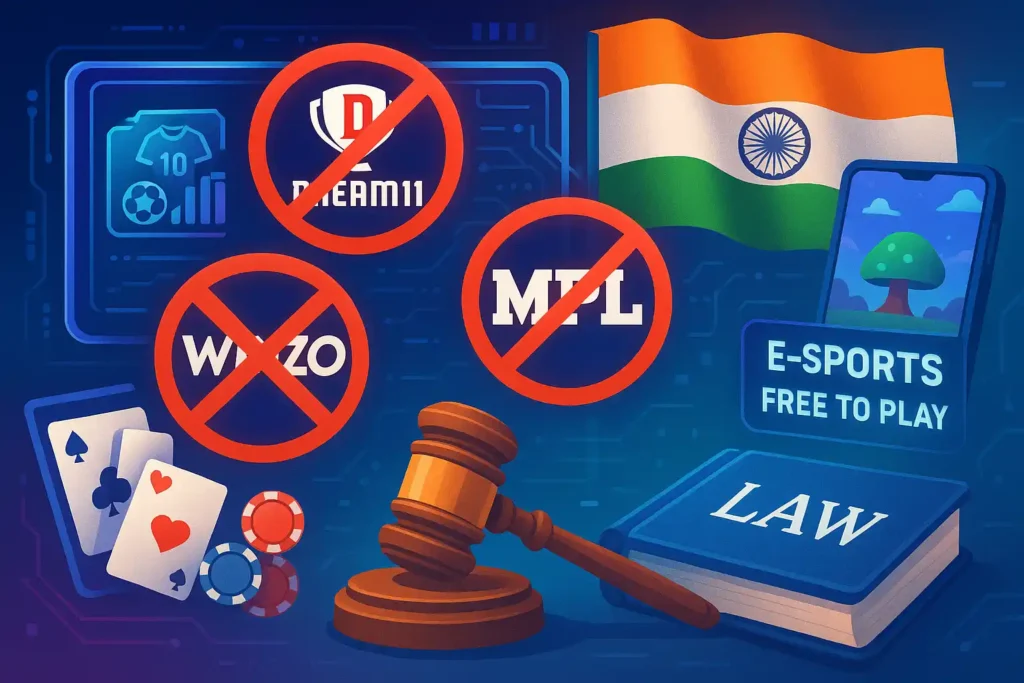India has enacted one of the most sweeping bans on real money gaming (RMG) worldwide through the Promotion and Regulation of Online Gaming Bill, 2025. Passed by both houses of Parliament on August 20-21, 2025, this legislation has effectively shut down a ₹2 lakh crore industry almost overnight, forcing major platforms to cease operations immediately.

Key Highlights
- Complete ban on real money gaming: all platforms where users deposit money expecting returns are now illegal.
- Major gaming platforms shut down: Dream11, MPL, Zupee, Gameskraft have suspended operations.
- ₹2 lakh crore industry impacted: over 200,000 jobs and ₹20,000 crore in annual tax revenue at risk.
- Harsh penalties for violations: up to 3 years imprisonment and ₹1 crore fines.
- E-sports and social gaming promoted: government recognizes competitive gaming as a legitimate sport.
- Legal challenges anticipated: constitutional and fundamental rights concerns are being raised.
The Scope of the Ban
The new legislation establishes a three-tier classification for online games. At the top are e-sports, which receive government recognition and active promotion, including training facilities and plans for India’s Olympic debut in 2027. Social games, such as free-to-play educational and recreational titles, occupy the middle tier. The bottom tier comprises real money gaming, which faces a complete prohibition. This category includes fantasy sports, rummy, poker, and any game where users deposit money with the expectation of monetary returns, regardless of whether the game is skill-based or chance-based.
Union Minister Ashwini Vaishnaw emphasized that real money platforms have been linked to money laundering, financial fraud, and terrorist financing, threatening national security and sovereignty. Government reports indicate that 450 million Indians lose approximately ₹20,000 crore annually in online gaming, with 41% of users encountering security breaches, and states like Tamil Nadu reporting 47 suicides related to gaming addiction between 2019 and 2024.
Immediate Industry Impact
The ban has forced leading gaming companies to halt operations:
- Dream11: India’s largest fantasy sports platform with over 280 million users, discontinued cash games and contests. CEO Harsh Jain announced that there is “no legal pathway to continue operations,” prompting the company to pivot to subsidiaries like FanCode and DreamSetGo.
- Mobile Premier League (MPL): Valued at $2.3 billion, MPL suspended all money gaming offerings while allowing users to withdraw balances as it transitions to free-to-play experiences.
- Zupee: Discontinued paid games but continues free versions of titles like Ludo Supreme.
- Gameskraft and Probo: Paused or halted all RMG offerings, including popular rummy and poker platforms.
- WinZO: Withdrew affected offerings starting August 22, 2025.
The financial implications are severe, with an estimated ₹31,000 crore annual revenue and ₹20,000 crore in tax contributions at risk, alongside over 200,000 jobs across 400+ companies.
Legal Challenges and Constitutional Concerns
Legal experts anticipate constitutional challenges once the law takes effect. Mumbai lawyer Jay Sayta petitioned President Droupadi Murmu to withhold assent, citing three primary concerns:
- Legislative competence: Betting and gambling fall under state jurisdiction (Entry 34, State List).
- Fundamental rights: Blanket bans may violate Article 19(1)(g), which guarantees the right to practice a profession.
- Judicial precedents: High Court and Supreme Court rulings previously upheld skill-based games as legitimate business activities.
States like Karnataka, Tamil Nadu, and Kerala have struck down previous bans on skill-based games, and the Punjab and Haryana High Court recognized fantasy sports as skill-based in 2017. The industry acknowledges a challenging legal battle ahead, especially with the government framing the ban as a national security measure.
🔗 Read More
Enforcement Challenges and Unintended Consequences
While the ban is comprehensive, enforcement may be difficult. Offshore operators have historically evaded Indian restrictions using domain switching, cryptocurrency wallets, and untraceable bank transactions. Current illegal gaming markets already surpass $100 billion annually, with platforms like Parimatch, Stake, and 1xBet recording 1.6 billion visits from Indian users in three months. These unregulated platforms typically lack consumer protections, anti-money laundering measures, and tax compliance, potentially creating the exact criminal finance risks the government aims to eliminate.
Global Context
India’s ban positions it among the most restrictive gaming jurisdictions globally. While countries like Saudi Arabia and certain Chinese regions maintain similar prohibitions, most major economies have embraced regulated frameworks balancing consumer protection, innovation, and tax revenue. The United States, post-2018 Supreme Court ruling, and several European Union nations have successfully expanded legal online gaming markets with protections against harm.
For international investors, India’s swift regulatory reversal raises questions about the predictability of technology sector policies, potentially affecting investment in fintech, digital payments, and other technology-dependent industries.
Looking Ahead: E-sports and Social Gaming
E-sports and social gaming represent the only viable paths for the Indian gaming industry under this legislation. E-sports can attract sponsorships, media rights, and tournament prizes, while social games may generate revenue through subscription models or in-app purchases. Some companies may explore international markets where real money gaming is legal, though they will face competition and regulatory challenges.
Conclusion
India’s 2025 real money gaming ban represents a dramatic policy shift that has instantly disrupted a thriving digital industry, jeopardizing jobs, investments, and consumer engagement. While the government cites national security and public health concerns, enforcement challenges and the potential migration to offshore platforms raise questions about the ban’s long-term efficacy. For the global tech community, this move underscores the regulatory risks associated with fast-growing digital markets, providing a cautionary tale on balancing innovation, economic growth, and societal protection.
Sources: Reuters, Economic Times, Moneycontrol, Livemint, India Today, New Indian Express



